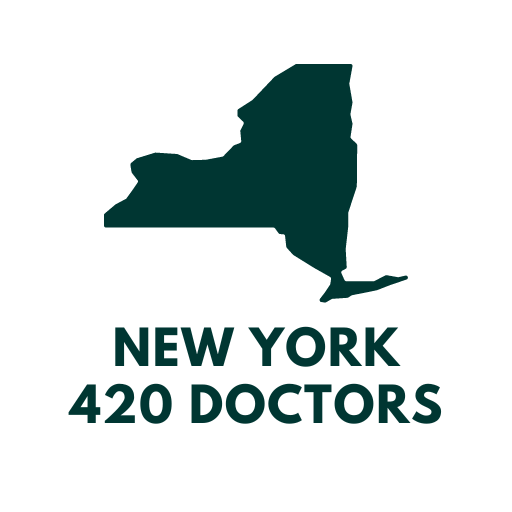With the legalization of medical marijuana in New York, many residents have questions about how this law interacts with federal and state regulations regarding gun ownership, particularly concealed carry permits. Medical marijuana is legal in New York for individuals who qualify under the state’s medical marijuana program. However, federal laws related to firearms present significant complications for medical marijuana users. This article will explain how medical marijuana use affects gun ownership and concealed carry permits in New York.
Federal Law: Controlled Substances Act and Gun Control Act
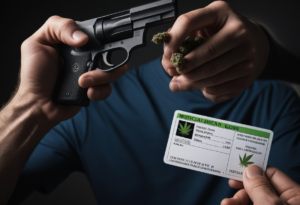
The key legal issue for medical marijuana users seeking to own firearms is the contradiction between federal and state laws. Under federal law, marijuana is classified as a Schedule I controlled substance under the Controlled Substances Act (CSA). This classification means that marijuana is viewed as having no accepted medical use and a high potential for abuse, despite its legalization in several states, including New York, for medical and recreational purposes.
The Gun Control Act of 1968 and regulations enforced by the Bureau of Alcohol, Tobacco, Firearms, and Explosives (ATF) make it illegal for individuals who use controlled substances, including marijuana, to own or possess firearms. Federal law prohibits anyone “who is an unlawful user of or addicted to any controlled substance” from shipping, transporting, receiving, or possessing firearms or ammunition.
Even though New York State permits the medical use of marijuana, federal law takes precedence over state law when it comes to firearms. As a result, medical marijuana users in New York are considered “unlawful users” of a controlled substance under federal law and are prohibited from owning or possessing firearms, including obtaining or maintaining a concealed carry permit.
Gun Ownership and Medical Marijuana in New York
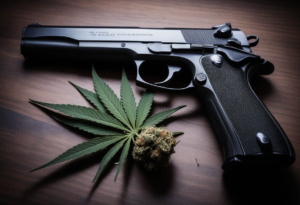
New York residents who are part of the medical marijuana program are often unaware that their participation can disqualify them from owning a gun. This confusion arises because state law allows for medical marijuana use, while federal law prohibits gun ownership for anyone who uses marijuana, even for medical reasons.
When purchasing a firearm from a licensed dealer, buyers are required to complete Form 4473, a form issued by the ATF. One of the questions on the form asks whether the buyer is an unlawful user of, or addicted to, marijuana or any depressant, stimulant, narcotic drug, or any other controlled substance. The form explicitly warns that marijuana remains illegal under federal law, even if it is legal in the buyer’s state for medical or recreational purposes.
If a buyer answers “yes” to the question about marijuana use, they are ineligible to purchase a firearm. If they answer “no” but are found to be a user of marijuana, they could face federal prosecution for making false statements on the form, which is a felony offense . This poses a serious legal risk for individuals with a New York Medical Marijuana Card (NY MMJ Card) who may wish to purchase a firearm.
Impact on Concealed Carry Permits
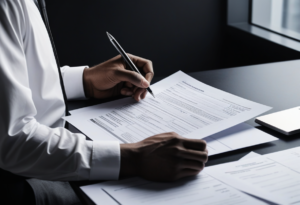
For those interested in obtaining a concealed carry permit in New York, the legal situation becomes even more complex. Federal law not only prohibits medical marijuana users from purchasing firearms but also disqualifies them from obtaining concealed carry permits. The Gun Control Act applies to all forms of firearm possession, including concealed carry.
In New York, obtaining a concealed carry permit requires a background check, which includes a review of criminal history, mental health records, and other factors that may disqualify an applicant. Since medical marijuana use is a federal disqualifier, individuals who hold a medical marijuana card will be denied a concealed carry permit, regardless of whether they meet the state’s other eligibility criteria.
Additionally, if an individual already has a concealed carry permit and subsequently obtains a medical marijuana card, they may face the revocation of their permit if the connection between their marijuana use and gun ownership is discovered.
Legal Consequences of Possessing Firearms and Marijuana
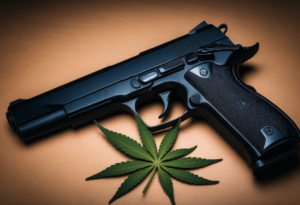
Under federal law, possessing both a firearm and marijuana—whether for medical or recreational use—is a serious offense. Even in states like New York where medical marijuana is legal, federal law overrides state law when it comes to gun ownership. This means that medical marijuana users in New York who own firearms could potentially face federal charges.
Violating the federal prohibition on gun ownership for marijuana users can result in severe penalties, including:
•Fines of up to $250,000
•Imprisonment for up to 10 years
•Felony conviction that could lead to a lifetime ban on owning firearms
In some cases, individuals may also face state-level charges if they violate New York’s firearms laws, which, while aligned with federal law, do not always provide clear protections for medical marijuana users who own guns.
Challenges for Medical Marijuana Patients

Medical marijuana patients in New York face difficult decisions regarding their health and their right to own firearms. For individuals who rely on medical marijuana to manage chronic pain, PTSD, or other qualifying conditions, losing the ability to own a firearm may feel like an unfair consequence of seeking medical treatment. Unfortunately, as long as marijuana remains illegal under federal law, the conflict between medical marijuana use and gun ownership is unlikely to be resolved.
Some gun rights advocacy groups have challenged the federal government’s stance on marijuana and firearms, arguing that individuals who use medical marijuana responsibly should not be automatically disqualified from owning guns. However, these legal challenges have so far been unsuccessful, and the ATF continues to enforce the federal prohibition on marijuana users possessing firearms.
Potential Legislative Changes
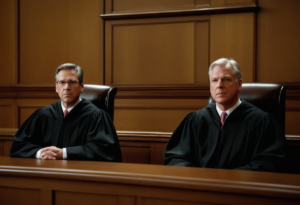
As public opinion shifts on marijuana legalization, there is growing pressure to reconcile state and federal laws regarding medical marijuana and gun ownership. Several states have introduced legislation that seeks to protect the rights of medical marijuana users to own firearms, but these state-level efforts are largely symbolic as long as federal law remains unchanged.
In the future, changes to federal marijuana laws, such as the potential rescheduling of marijuana from a Schedule I to a less restrictive category, could open the door to changes in gun ownership regulations for medical marijuana users. However, until such changes occur, individuals with a New York Medical Marijuana Card should be aware of the risks involved in owning firearms or applying for a concealed carry permit.
Conclusion
In New York, medical marijuana patients are prohibited from owning or possessing firearms under federal law, despite the state’s legalization of medical marijuana. This federal prohibition extends to the purchase of firearms, the possession of firearms, and the issuance of concealed carry permits. For those holding a New York Medical Marijuana Card, it is crucial to understand the legal risks involved in trying to maintain both gun ownership and medical marijuana use.

